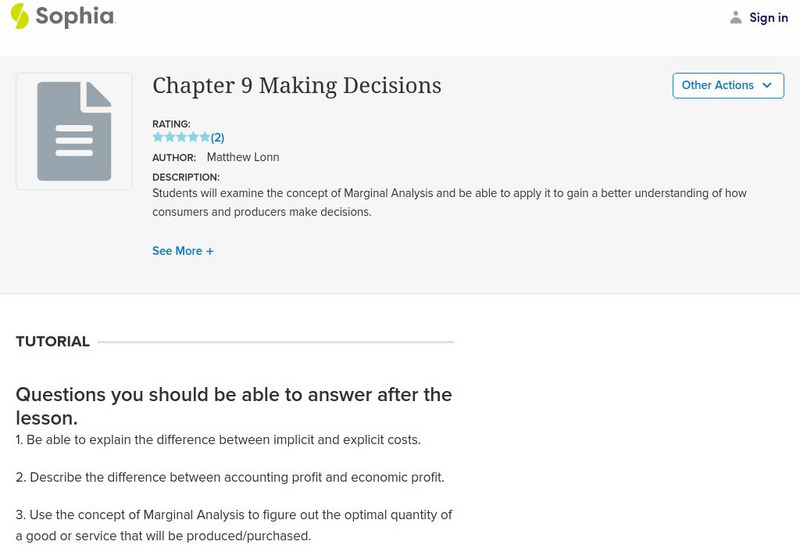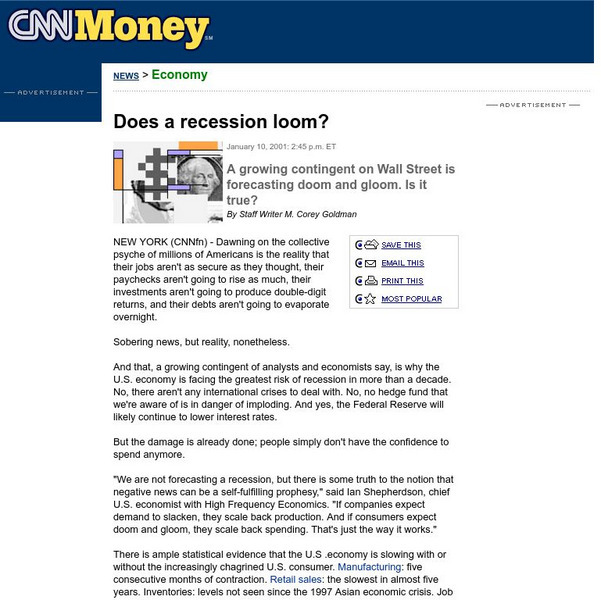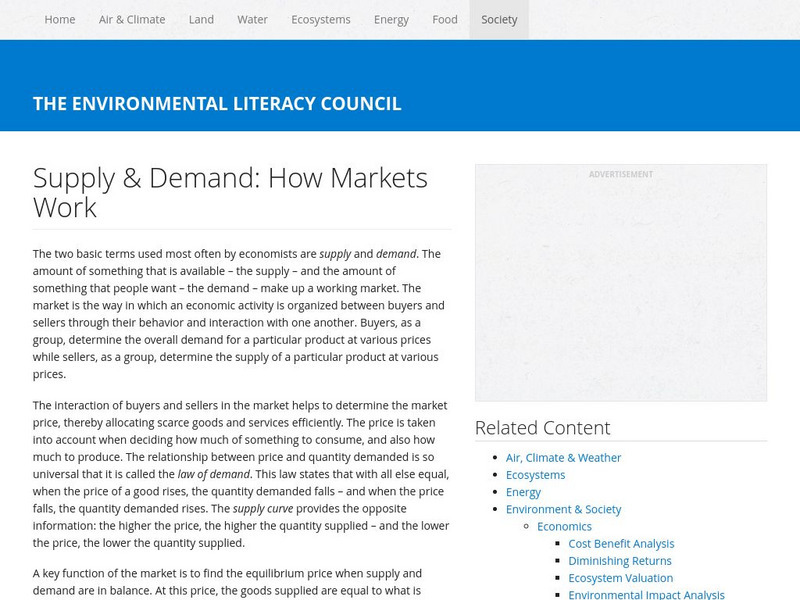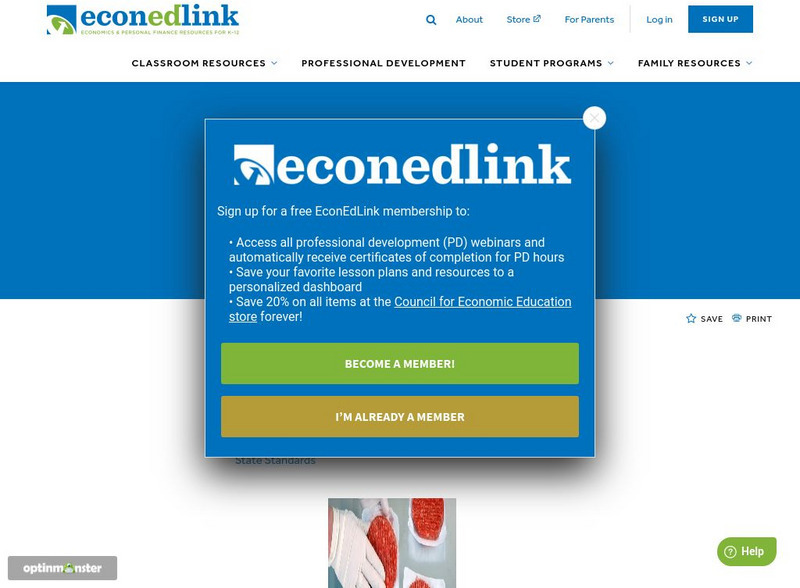Council for Economic Education
Econ Ed Link: Avatar, King of the Box Office?
On January 26, 2010, the film Avatar officially topped Titanic as the top-grossing film of all-time at the box office. However, the following day, Forbes.com published an article entitled Is Avatar Really King of the Box Office? The...
Council for Economic Education
Econ Ed Link: Was Babe Ruth Under Paid?
This lesson demonstrates a method for teaching students about inflation and the Consumer Price Index, using baseball players' salaries for purposes of illustration. Babe Ruth's salary from 1931 is adjusted to account for changes in the...
Other
Co Op America
The Co-op America foundation is a non-profit organization that focuses on fair economic practices to teach social and environmental responsibility. Their many programs such as Green Business, Green Energy, Fair Trade, Responsible Shopper...
University of Missouri
University of Missouri: Wise Pockets: Berenstain Bears' Trouble With Money
Using a Berenstain Bears' book, students are introduced to concepts such as spending, goods, services, income, saving, and interest. Lesson is detailed and has good activities. Includes questions about the story that teach students about...
Sophia Learning
Sophia: Making Decisions
Notes and a video clip provide students with an introduction to the idea of marginal analysis and of how consumers and producers make decisions.
CNN
Cnn Money: Does a Recession Loom?
What caused the economic recession of 2001? According to this CNN Money article, a lack of consumer confidence to spend money, poor corporate performace, contraction in the manufacturing and retail sales sectors, and job layoffs.
Council for Economic Education
Econ Ed Link: What Happened to Railroads?
Between the Civil War and World War II, railroads were one of the nation's most important businesses and an integral part of people's lives. In this instructional activity, students assume the role of detectives investigating why the...
University of Nebraska Omaha
Ecedweb: Explorations in Supply, Part Ii
In this economics tutorial, you as a producer have to determine how much of a given product you should make.
Council for Economic Education
Econ Ed Link: What Do People Want to Wear?
To stay in business, fashion merchandisers must be able to anticipate what consumers want. By looking at different retail websites, students will look to anticipate what consumers are demanding. Students will then go through the market...
Council for Economic Education
Econ Ed Link: Be an Energy Saver
This lesson focuses on the scarce and non-renewable nature of fossil fuels in order to stimulate student thinking about energy conservation. It emphasizes the fact that saving energy can be good for the wallet as well as the earth's...
The Environmental Literacy Council
Environmental Literacy Council: Supply and Demand: How Markets Work
An article on supply and demand and how markets work. Related links for teachers.
Council for Economic Education
Econ Ed Link: Are the Best Things in Life Free?
Students use economic reasoning to analyze the costs and consequences of choice. The idea that the best things in life are free is widely expressed as a maxim by people who know nothing of its origin. They know it's true through...
Council for Economic Education
Econ Ed Link: What Does a Dollar Really Buy?
Students will describe the purpose of a price index, and how it is calculated. Then students will describe the weaknesses of the CPI, and interpret CPI data as a measure of economic health. Finally, students will identify who is harmed...
Council for Economic Education
Econ Ed Link: Frontier Specialists
The level of output in an economy can be increased through specialization. Economic specialization occurs when people produce different goods and services than they consume. It requires people to exchange goods and services.
Practical Money Skills
Practical Money Skills: Recession
Learn about recessions, periods of economic slowdown often marked by high rates of unemployment, plunging stock prices, lower corporate profitability, and consumer anxiety.
University of Groningen
American History: Outlines: The Booming 1920s
Section on the post-war economic boom and social changes that hit in the 1920s after World War I.
Council for Economic Education
Econ Ed Link: Marketplace: Real(ity) Estate
This lesson teaches learners about opportunity cost through some steps of buying a house. It also shows students how advertising affects consumer decision-making.
Council for Economic Education
Econ Ed Link: Jesse 'The Body' Wants to Give Money Away!
During his campaign for governor of the State of Minnesota, former professional wrestler Jesse "The Body" Ventura, promised to return to the taxpayers of Minnesota the budget surpluses that had been accumulating in the state. Upon...
Council for Economic Education
Econ Ed Link: Be an Ad Detective
Every day, students are bombarded by advertising. They cannot escape it. But marketers realize that many ypung people are becoming very good at tuning ads out. Businesses thus are becoming more creative in their communication with...
Council for Economic Education
Econ Ed Link: The Choice Is Us: Monopolies
This lesson plan introduces the concept of monopoly. It calls upon middle schoolers to consider how monopoly power might affect the quality and price of goods and services offered to consumers. In light of what they learn about the...
Council for Economic Education
Econ Ed Link: Business Ownership: The Franchise Option
Students explore an alternative to starting a business from scratch- investing in a franchise. They begin by considering the pros and cons of a franchise and whether this form of business is an option that would fit their personality and...
Council for Economic Education
Econ Ed Link: Deceptive Advertising: Crossing the Line
Businesses use advertising to tell consumers about the goods and services they are selling. Businesses hope that their advertisements will convince people to buy their products. In this lesson, students examine the ground rules for...
Council for Economic Education
Econ Ed Link: Guess Who's Coming to Dinner
This lesson plan introduces regulation and information as two tools used by government to promote fair competition and complete information in a market economy. Using the 1906 Pure Food and Drugs Act as a case study, students explore the...
Council for Economic Education
Econ Ed Link: Nothing to Buy
This site is a printable instructional activity that compares the command economy of Soviet Russia with the market economy of present day Russia. Lesson provides tables with data comparing prices within the two systems. Discussion...







